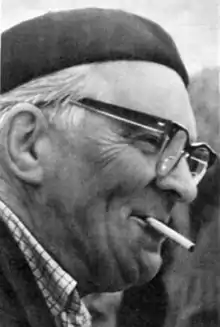Boris Barnet
Boris Vasilyevich Barnet (Russian: Бори́с Васи́льевич Ба́рнет; 18 June 1902 – 8 January 1965) was a Soviet film director, actor and screenwriter of British origin. He directed 27 films between 1927 and 1963.
Boris Barnet | |
|---|---|
 Boris Barnet | |
| Born | Boris Vasilyevich Barnet 18 June 1902 |
| Died | 8 January 1965 (aged 62) |
| Occupation | Film director Screenwriter |
| Years active | 1927–1963 |
| Spouse(s) | Natalia Glan (1926–1927) Yelena Kuzmina (1928–1936) Valentina Barnet Alla Kazanskaya |
| Children | Olga Barnet |
Early years
Boris Barnet was born in Moscow. His grandfather Thomas Barnet was a printer who moved to the Russian Empire from Great Britain back in the 19th century.[1] A student of the Moscow Art School, he volunteered to join the Red Army at age 18 and was then professionally involved in boxing. In 1927 he shot his first feature, a comedy film, The Girl with a Hatbox, starring Anna Sten. His 1928 melodramatic film The House on Trubnaya, starring Vera Maretskaya, was rediscovered in the mid-1990s and now ranks as one of the classic Russian silent films.
Encouraged in his early efforts by Yakov Protazanov, Barnet emerged in the 1930s as one of the country's leading film-makers, working with the likes of Serafima Birman and Nikolai Erdman. Outskirts (1933), a pacifist story acclaimed at the first Venice Film Festival, is considered one of Barnet's masterpieces.
Later years and work
Barnet's postwar work is exemplified by Secret Agent, the first Soviet spy film. The Stalin Prize-winning film was also years ahead of its time in exhibiting Hitchcockian influence and tricks and helped cement Barnet's reputation abroad.[2]
It was Barnet's gift of artistic invention that made him stand out from the crowd of Soviet colleagues. In a Barnet film, a photograph in the newspaper would unexpectedly come alive, and scenes would often end with a detail introducing the next scene. He would begin a scene with a close up, "so that the space is progressively discovered by changing the axis or by camera movement".[2] Among Russian filmmakers professing their admiration for Barnet was Andrei Tarkovsky.
In 1965, after some years of artistic silence Boris Barnet committed suicide in Riga, Latvian SSR[3] by hanging himself in a hotel room.[4][5] He was survived by wife Alla Kazanskaya and daughter Olga Barnet.
Filmography
- As director
- Miss Mend (Мисс Менд) (1926)
- The Girl with a Hatbox (Девушка с коробкой)(1927)
- Moscow in October (Москва в Октябре) (1927)
- The House on Trubnaya (Дом на Трубной) (1928)
- The Living Corpse (1929)
- Living Things (Живые дела) (1930)
- The Ghost (Привидения) (1931)
- The Thaw (Ледолом) (1931)
- Outskirts (Окраина) (1933)
- By the Bluest of Seas (У самого синего моря) (1936)
- A Night in September (Ночь в сентябре) (1939)
- The Old Horseman (Старый наездник) (1940) output to the screen in 1959
- A Good Lad (Славный малый) (1942)
- Dark Is the Night (Однажды ночью) (1945)
- Secret Agent (Подвиг разведчика) (1947)
- Pages of Life (Страницы жизни) (1948)
- Bountiful Summer (Щедрое лето) (1950)
- Lyana (Ляна) (1955)
- The Poet (Поэт) (1956)
- The Wrestler and the Clown (Борец и клоун) (1957)[6]
- Annushka (Аннушка) (1959)
- Alyonka (Алёнка) (1961)
- Whistle Stop (Полустанок) (1963)
- As actor
- The Extraordinary Adventures of Mr. West in the Land of the Bolsheviks (1924)
- Miss Mend (1926)
- Storm Over Asia (1928)
- Secret Agent (Подвиг разведчика) (1947)
References
- Nekipelov A.D., Danilov-Danilyan V.I. New Russian Encyclopedia in 12 Volumes. Volume 2. Entsiklopediya, 2005. ISBN 978-5-94802-009-9
- Richard Taylor, Ian Christie. Inside the Film Factory: New Approaches to Russian and Soviet Cinema. Routledge, 1991. Page 158.
- Vivaldi, Guiliano (31 July 2011). "Boris Barnet: The Lyric Voice in Soviet Cinema". Bright Lights Film Journal.
- Kehr, Dave (11 December 2009). "All-American Soviet Heroine". The New York Times.
- Wilmington, Michael (6 February 2004). "Boris Barnet series reveals a neglected Russian talent". Chicago Tribune.
- Thompson, Howard (1 January 1959). "Screen: Soviet Big Top / 'Wrestler and Clown' on View at Cameo". The New York Times. Retrieved 1 December 2019.
External links
- Boris Barnet at IMDb
